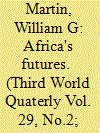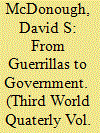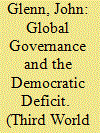|
|
|
Sort Order |
|
|
|
Items / Page
|
|
|
|
|
|
|
| Srl | Item |
| 1 |
ID:
081231


|
|
|
|
|
| Publication |
2008.
|
| Summary/Abstract |
This article contests dominant projections of Africa's future, most notably the Afro-pessimism that permeates almost all Northern analyses. While long-term data do confirm the continent's developmental impasse, they also dispute the dominant argument that Africa has been isolated and disengaged from the world economy. Indeed, Africa has been increasingly engaged with-and impoverished by-its relationships with Europe and North America. African scholars, recognising this dilemma, call for a return of the 'developmental state'. This recommendation, however, like Afro-pessimist projections, fails to take into account fundamental transformations in Africa's geostrategic and world-economic relationships. The implications of two key, global transitions are traced for Africa and particularly South Africa: first, the disruptive power of global social movements; second, the rise of Asia and the demise of US and European hegemony over Africa
|
|
|
|
|
|
|
|
|
|
|
|
|
|
|
|
| 2 |
ID:
081230


|
|
|
|
|
| Publication |
2008.
|
| Summary/Abstract |
This paper examines the connection between China's domestic governance and its involvement in global governance in environmental protection by studying the major actors and issues involved in the interaction between the domestic and international spheres of activities. These actors include international institutions, national and local governments, nongovernmental organisations, and others. The paper demonstrates that China has made some substantive progress in protecting its environment, but much more needs to be done. Internationally it seems to lack the will or the capability to make much contribution towards global environmental governance. However, because of its huge aggregate size, what it does or does not do to avert environmental degradation at home could have a significant impact on collective efforts to protect the environment at the global level.
|
|
|
|
|
|
|
|
|
|
|
|
|
|
|
|
| 3 |
ID:
081223


|
|
|
|
|
| Publication |
2008.
|
| Summary/Abstract |
This paper offers a critical perspective on the growing phenomenon of governance indicators in international politics. I employ a governmentality approach to shed light on the political meanings and outcomes of the increasing tendency of various international actors to rate and rank the governance capacities and performances of states. In particular, I argue that, beyond being an analytic tool or an advisory system for governments, this practice in fact reproduces structures of authority and hierarchy in the international system. Power and knowledge are bound together in many governance indicators, as powerful states either examine themselves, the quality of governance of Third World states, or adopt the examinations carried out by other agents. Consequently, poor and developing states cannot simply ignore these ratings and rankings. The governance indicators establish a discursive field of state legitimacy and normalcy and 'responsibilises' states: construct them as ethical actors that are capable of correct and responsible choices and policies. As a result, the responsibility of powerful states and international actors for a host of social, economic and political problems in many Third World countries is obscured. Therefore the paper calls for closer attention to be paid to the elements of power in these governance indicators
|
|
|
|
|
|
|
|
|
|
|
|
|
|
|
|
| 4 |
ID:
081222


|
|
|
|
|
| Publication |
2008.
|
| Summary/Abstract |
In the 1990s, around the world, government policies on fdi were unequivocally fdi -friendly. Numerous policy changes were enacted to make the investment climate more favourable to fdi. However, over the past few years a range of countries has enacted policy measures less favourable to fdi. Does this represent an overall shift in fdi policy thinking? And, if so, what are the current drivers of such a change? This paper discusses trends in contemporary fdi policy and the role played by prevailing narratives, actors and the changing context in shaping policy.
|
|
|
|
|
|
|
|
|
|
|
|
|
|
|
|
| 5 |
ID:
081232


|
|
|
|
|
| Publication |
2008.
|
| Summary/Abstract |
Post-conflict stability remains an elusive goal for many African countries. The political and socioeconomic preconditions of African civil wars have often persisted after the end of open hostilities and have frustrated regional and international efforts at peace building. The growing role of non-state armed groups in post-conflict governments raises further questions on the important role of guerilla groups in either exacerbating or ameliorating the 'structural' preconditions of protracted African wars. The cases of Liberia, Uganda and Rwanda offer important insights on the complex interplay between armed groups and governments that underlie these conflicts. All three countries have been marked by devastating civil wars and the subsequent formation of post-conflict governments led by respective insurgent groups, but only Rwanda and Uganda have made any effort to mitigate the conditions that ultimately led to intra-state violence and state collapse. While the conflict dynamic may heavily condition an insurgent group, these factors alone do not play a determining role in the success or failure of peace building efforts
|
|
|
|
|
|
|
|
|
|
|
|
|
|
|
|
| 6 |
ID:
081221


|
|
|
|
|
| Publication |
2008.
|
| Summary/Abstract |
This paper examines the democratic credentials of three key international institutions (the imf, World Bank and the wto) with regard to the majority of developing countries. In so doing the paper argues that we need to understand the democratic deficit of these institutions not only in terms of input legitimacy, but also in terms of output legitimacy and procedural fairness. The level and quality of these three aspects of democracy vary depending upon the international institution in question, but each of these institutions suffers from a democratic deficit in all three spheres. The paper therefore puts forward several reform proposals in order to overcome the problems outlined
|
|
|
|
|
|
|
|
|
|
|
|
|
|
|
|
| 7 |
ID:
081233


|
|
|
|
|
| Publication |
2008.
|
| Summary/Abstract |
Undermining the narrow critical approaches which neglect the potential intersection between modernism and postcolonialism, this paper explores the attempt by contemporary Arab poets to engage Western modernist heritage in order to articulate domestic narratives integral to the geopolitics of the Arab region in the postcolonial era. In an attempt to redefine tradition and deviate from fossilised inherited legacies and tyrannical regimes, postcolonial Arab writers, led by the Iraqi poet, Abdul-Wahhab Al-Bayati, pursue solace and redemption inWwestern modernism, developing Western forms into a poetics of resistance and protest. Through textual apprenticeship, assimilated from Western literature and culture, they combine modernism and postcolonialism into a nexus incorporating Western techniques while emphasising variants and displacements between their nationalist perspective and that of their Western forebears. Convinced of the role played by the West in the shaping of modern Arabic cultural traditions, Al-Bayati reconstructs colonial modernism as a narrative of liberation, engaging in dialogues with Western pioneering writers and masterpieces. Transforming Western modernist strategies into a revolutionary construct, Al-Bayati aims to challenge internal oppression and external hegemony. Through tran-cultural entanglement and textual appropriation of Western narratives he provides diversity and insight into postcolonial Arabic poetry, intensifying the awareness of other traditions and reconstructing his own heritage
|
|
|
|
|
|
|
|
|
|
|
|
|
|
|
|
| 8 |
ID:
081229


|
|
|
|
|
| Publication |
2008.
|
| Summary/Abstract |
This article surveys the evolution of party systems in South America in terms of their level of institutionalisation. In recent times political competition in much of South America has become less structured by political parties proper and has moved in the direction of candidate-centred movements and electoral vehicles led by political entrepreneurs. Most countries in South America (Brazil, Chile and Uruguay are exceptions) have experienced party system de-institutionalisation during the 1990s and 2000s, as voters have systematically punished traditional parties, often rendering them marginal or forcing their disappearance. The scale of decomposition varies across cases but it has affected countries with historically well institutionalised party systems and those with inchoate party systems (Ecuador, Peru, Bolivia) alike.
|
|
|
|
|
|
|
|
|
|
|
|
|
|
|
|
| 9 |
ID:
081228


|
|
|
|
|
| Publication |
2008.
|
| Summary/Abstract |
This article critically reflects on the ways in which the global project of transitional justice is channelled or streamlined in its scope of application. Using the categories of when, to whom and for what transitional justice applies, it argues that transitional justice is typically constructed to focus on specific sets of actors for specific sets of crimes. This results in a fairly narrow interpretation of violence within a somewhat artificial time frame and to the exclusion of external actors. The article engages themes of gender, power and structural violence to caution against the narrowing and depoliticisation of transitional justice
|
|
|
|
|
|
|
|
|
|
|
|
|
|
|
|
|
|
|
|
|